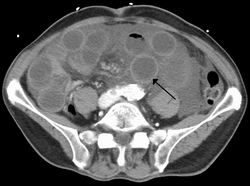Intestinal ischemia

Editor-In-Chief: Prab R Tumpati, MD
Obesity, Sleep & Internal medicine
Founder, WikiMD Wellnesspedia &
W8MD's medical weight loss NYC, sleep center NYC
Philadelphia medical weight loss and Philadelphia sleep clinics
| Intestinal ischemia | |
|---|---|

| |
| Synonyms | N/A |
| Pronounce | N/A |
| Specialty | N/A |
| Symptoms | Abdominal pain, vomiting, diarrhea, bloody stool |
| Complications | Sepsis, perforation, peritonitis, death |
| Onset | Sudden or gradual |
| Duration | Variable |
| Types | N/A |
| Causes | Atherosclerosis, embolism, thrombosis, hypotension |
| Risks | Smoking, high blood pressure, high cholesterol, diabetes, age |
| Diagnosis | CT scan, MRI, angiography, colonoscopy |
| Differential diagnosis | Gastroenteritis, appendicitis, inflammatory bowel disease |
| Prevention | N/A |
| Treatment | Surgery, angioplasty, anticoagulants, antibiotics |
| Medication | Anticoagulants, vasodilators |
| Prognosis | Variable, depends on severity and treatment |
| Frequency | Rare |
| Deaths | N/A |

Intestinal ischemia refers to a medical condition characterized by an inadequate blood supply to the intestine, leading to inflammation and injury of the intestinal tissues. This condition can affect the small intestine, large intestine, or both.
Causes[edit]
Intestinal ischemia is often caused by a blockage in the arteries that supply blood to the intestine. This blockage can be due to:
- Blood clots: These can form in the heart or a large artery, then travel through the bloodstream and block a smaller artery in the intestine.
- Atherosclerosis: This is a condition where fatty deposits build up on the inner walls of the arteries, narrowing them and reducing blood flow.
- Vasculitis: This is an inflammation of the blood vessels that can cause blockages.
- Hernia: A hernia can cause a portion of the intestine to become twisted or kinked, blocking blood flow.
Symptoms[edit]
Symptoms of intestinal ischemia can vary depending on the severity and location of the condition. They may include:
- Abdominal pain: This is often severe and sudden in onset.
- Nausea and vomiting
- Diarrhea
- Blood in the stool
- Fever
Diagnosis[edit]
Diagnosis of intestinal ischemia typically involves a combination of medical history, physical examination, and diagnostic tests. These tests may include:
- Blood tests: These can help identify signs of infection or inflammation.
- Imaging tests: These may include CT scan, MRI, or ultrasound to visualize the blood vessels and intestines.
- Angiography: This is a procedure that uses dye and special X-rays to show the inside of the blood vessels.
Treatment[edit]
Treatment for intestinal ischemia aims to restore blood flow to the intestine as quickly as possible. This may involve:
- Medication: Drugs can be used to dissolve blood clots, reduce inflammation, or treat infection.
- Surgery: In severe cases, surgery may be needed to remove the blockage or repair damaged sections of the intestine.
Prognosis[edit]
The prognosis for intestinal ischemia depends on the extent of the condition and the patient's overall health. Early diagnosis and treatment can improve the prognosis significantly.
See also[edit]
Ad. Transform your life with W8MD's Budget GLP-1 injections from $75


W8MD offers a medical weight loss program to lose weight in Philadelphia. Our physician-supervised medical weight loss provides:
- Weight loss injections in NYC (generic and brand names):
- Zepbound / Mounjaro, Wegovy / Ozempic, Saxenda
- Most insurances accepted or discounted self-pay rates. We will obtain insurance prior authorizations if needed.
- Generic GLP1 weight loss injections from $75 for the starting dose.
- Also offer prescription weight loss medications including Phentermine, Qsymia, Diethylpropion, Contrave etc.
NYC weight loss doctor appointmentsNYC weight loss doctor appointments
Start your NYC weight loss journey today at our NYC medical weight loss and Philadelphia medical weight loss clinics.
- Call 718-946-5500 to lose weight in NYC or for medical weight loss in Philadelphia 215-676-2334.
- Tags:NYC medical weight loss, Philadelphia lose weight Zepbound NYC, Budget GLP1 weight loss injections, Wegovy Philadelphia, Wegovy NYC, Philadelphia medical weight loss, Brookly weight loss and Wegovy NYC
|
WikiMD's Wellness Encyclopedia |
| Let Food Be Thy Medicine Medicine Thy Food - Hippocrates |
Medical Disclaimer: WikiMD is not a substitute for professional medical advice. The information on WikiMD is provided as an information resource only, may be incorrect, outdated or misleading, and is not to be used or relied on for any diagnostic or treatment purposes. Please consult your health care provider before making any healthcare decisions or for guidance about a specific medical condition. WikiMD expressly disclaims responsibility, and shall have no liability, for any damages, loss, injury, or liability whatsoever suffered as a result of your reliance on the information contained in this site. By visiting this site you agree to the foregoing terms and conditions, which may from time to time be changed or supplemented by WikiMD. If you do not agree to the foregoing terms and conditions, you should not enter or use this site. See full disclaimer.
Credits:Most images are courtesy of Wikimedia commons, and templates, categories Wikipedia, licensed under CC BY SA or similar.
Translate this page: - East Asian
中文,
日本,
한국어,
South Asian
हिन्दी,
தமிழ்,
తెలుగు,
Urdu,
ಕನ್ನಡ,
Southeast Asian
Indonesian,
Vietnamese,
Thai,
မြန်မာဘာသာ,
বাংলা
European
español,
Deutsch,
français,
Greek,
português do Brasil,
polski,
română,
русский,
Nederlands,
norsk,
svenska,
suomi,
Italian
Middle Eastern & African
عربى,
Turkish,
Persian,
Hebrew,
Afrikaans,
isiZulu,
Kiswahili,
Other
Bulgarian,
Hungarian,
Czech,
Swedish,
മലയാളം,
मराठी,
ਪੰਜਾਬੀ,
ગુજરાતી,
Portuguese,
Ukrainian


